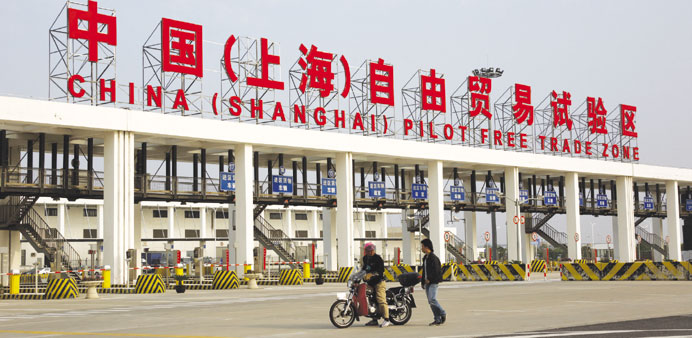A man speaks to a motorbike taxi driver in front of Shanghai Pilot Free Trade Zone. China’s National Development and Reform Commission yesterday cut the number of sectors where foreign investment is restricted to 35 from 79.
Reuters/Beijing
China’s top economic planning agency issued a final list of restricted and prohibited industries for foreign investors, slightly elaborating on an earlier draft that had been criticised by foreign business lobbies as being too broad.
China has vowed to increase the competitiveness of its economy by loosening restrictions on its manufacturing and service sectors, as it tries to improve inefficient state-owned firms by adopting market-friendly policies to stave off slowing growth.
In a preliminary list issued in November, the National Development and Reform Commission (NDRC) cut the number of sectors where foreign investment is restricted to 35 from 79, opening up areas such as real estate, steel, oil refining, paper making and premium spirits. However, it outright prohibited foreign investment in 36 areas, with Chinese legal affairs consulting, tobacco and cultural relics businesses added to the list.
The final list, issued jointly by the NDRC and the Commerce Ministry online yesterday but set to go into effect on April 10, largely mirrored the earlier draft. The regulator kept the prohibition on foreign investment in 36 sectors, while the number of restricted industries grew slightly to 38.
“This catalogue revision suits the new situation of our country’s reform, development and economic globalisation,” the NDRC said in a statement accompanying the list. It said the list had already been approved by the State Council, China’s cabinet.
Among the list’s main aims were to “orderly advance service industry openness” and put forward a series of opening measures in the logistics, e-commerce, transportation, social services, finance and cultural sectors, the NDRC said.
While this represents progress for foreign investment in China, it is only incremental, said James Zimmerman, chairman of the American Chamber of Commerce in China.
US businesses are focused on completing a “high-standard” bilateral investment treaty between the US and China with only limited exclusions, he said.
“We believe that there is much room for improvement to ensure a greater level of market access in various sectors.”
China’s government plans to reform state-owned enterprises but has been reluctant to cede too much control over industries it deems central to national interests. Foreign business lobbies had said the improvements in the draft fell short of expectations, instead advocating that China adopt a much shorter “negative list” of off-limit industries while further opening access to the services sector.

